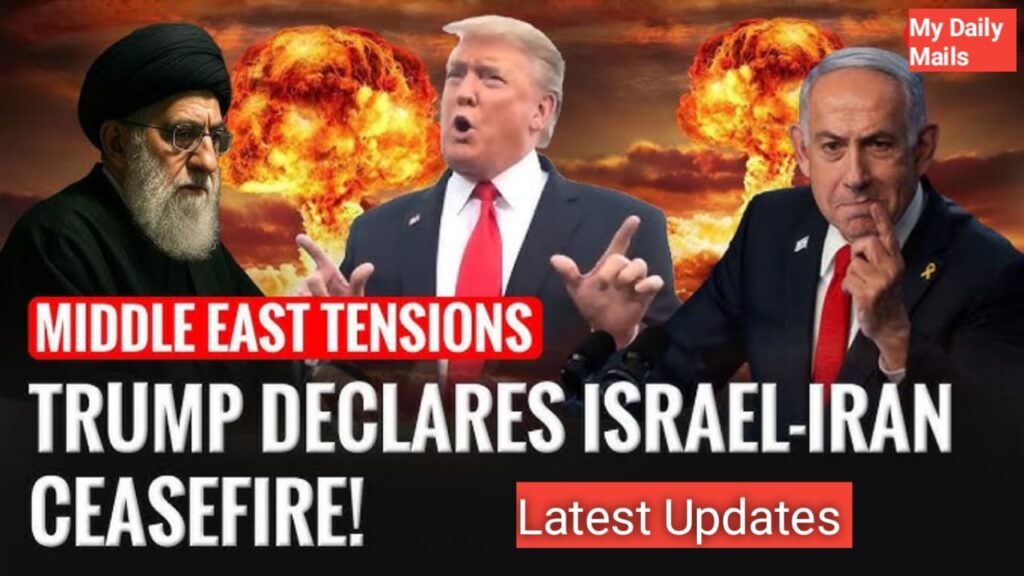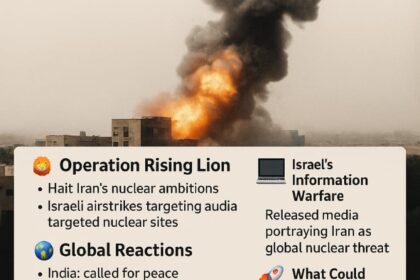
Iran Fires Missiles at U.S. Bases, Trump Announces Sudden Ceasefire
In a shocking escalation of Middle East tensions, Iran launched a barrage of 12 missiles targeting U.S. military bases late last night. The United States claimed it intercepted most of them, and fortunately, no casualties or infrastructure damage was reported. However, this sudden military confrontation was soon followed by an unexpected ceasefire announcement from former U.S. President Donald Trump — a move that has left the global community puzzled.
Key Developments at a Glance
| Event | Details |
| Iran Fires Missiles | 12 missiles launched at U.S. military bases; no damage reported |
| Trump’s Ceasefire Announcement | Declares full ceasefire between Iran and Israel within 6 hours |
| Iran’s Response | Rejects Trump’s ceasefire proposal; continues missile strikes |
| Israel’s Reaction | No official statement from PM Netanyahu; IDF confirms attacks |
Iran Strikes First, U.S. Intercepts Most Missiles
The situation escalated rapidly when Iran launched 12 missiles toward U.S. military installations in the region. The Pentagon reported that nearly all missiles were successfully intercepted, and one fell in an uninhabited area. No soldiers were injured, and the U.S. declared there was no damage to its bases.
Trump Declares a Ceasefire… But Iran Disagrees
In a surprising twist, Donald Trump took to social media hours after the attack, congratulating both Iran and Israel for agreeing to a “complete and total ceasefire” within six hours. His declaration was met with skepticism as Iranian authorities immediately rejected the claim, asserting that no such agreement had been made.
Iran’s state media labeled Trump’s statements as “false and misleading,” accusing the U.S. of trying to divert attention from its vulnerabilities.
Israel Still Under Fire Despite Ceasefire Claims
While Trump celebrated peace, Israeli Defense Forces (IDF) continued to report incoming missile attacks from Iran. Residential areas in Israel were hit, and visuals of destruction emerged across global news platforms. Despite the ongoing violence, Israeli PM Benjamin Netanyahu remained silent, leading many to suspect a lack of coordination or consent from Israel regarding Trump’s ceasefire announcement.
Trump Under Fire for Forcing a Fragile Peace
Observers believe that Trump is pressuring both nations into an unstable ceasefire to protect global oil markets and prevent economic shocks. Analysts argue that Trump’s primary motivation behind this abrupt peace declaration is to curb rising oil prices, which could fuel global inflation and hamper U.S. economic recovery.
Oil Prices Crash, Global Markets React
Immediately after Trump’s ceasefire announcement, crude oil prices plummeted by over 6%. This sharp decline offered temporary relief to countries like India and China, who depend heavily on oil imports. India, in particular, may benefit in terms of fiscal stability and stock market growth due to reduced import costs.
Why Trump “Chickened Out” – Economic Over Strategy?
According to Trump’s earlier tweets, he expressed serious concern over rising fuel prices and their impact on the U.S. economy. In one tweet, he warned oil producers:
“If you raise prices, you support the enemy.”
He also pushed for more domestic oil drilling in the middle of jitters that Iran may close critical shipping lane.
This suggests that Trump prioritized economic stability over military retaliation, possibly under pressure from global stakeholders like India and China who do not want a prolonged war in the Middle East.
The Rise and Fall of “Operation Rising Lion”
Earlier in the week, Trump supported Operation Rising Lion, which aimed at targeting Iran’s nuclear infrastructure. However, satellite imagery and intelligence reports indicate minimal damage to Iran’s nuclear program. There’s speculation that Trump’s regime change ambitions in Iran have failed, leading to this sudden pivot towards peace.
Public Reactions: Mixed, Skeptical, and Furious
Israeli Citizens:
Many Israelis feel betrayed by Trump’s sudden decision, especially since Iran’s missile strikes have not stopped. The Israeli public is questioning PM Netanyahu’s silence, and some believe the country has gained nothing from this confrontation.
Iranian Media:
Iranian agencies are calling this ceasefire a U.S. face-saving tactic after failing to destroy Iran’s strategic assets. They insist that Tehran remains prepared for a long war, possibly lasting two to six months.
Conclusion: Ceasefire or Just a Pause?
Despite Trump’s declaration of a complete ceasefire, missile attacks continue, and Iran openly denies any agreement. With Israel remaining officially silent and Iran intensifying its rhetoric, it seems the so-called ceasefire is more of a “pause” than a permanent peace deal.
FAQs: Iran-Israel-US Crisis Explained
Q1: Did Iran actually agree to a ceasefire?
No. Iran’s media has rejected all ceasefire claims made by Trump and continues its military operations.
Q2: Is Israel complying with the ceasefire?
Israel has made no official statement, but continues to report missile attacks, indicating no cessation of hostilities.
Q3: Why did Trump announce a ceasefire?
Trump likely wants to prevent rising oil prices and global inflation, especially with upcoming U.S. elections.
Q4: Has Iran’s nuclear program been destroyed?
No. Reports confirm Iran’s nuclear infrastructure is still intact, and enriched uranium may have been moved before the strikes.
Q5: What’s next for the region?
The situation remains volatile, and unless real diplomatic channels engage, this conflict may re-escalate soon.
Final Note
Trump’s unilateral ceasefire declaration appears more like an economic maneuver than a strategic victory. As Iran’s missiles continue to rain on Israeli soil, the world watches closely—uncertain whether this fragile pause will evolve into real peace or another chapter of Middle East instability.
Stay updated with real-time developments via IDF’s official Twitter
Follow international coverage on CNN, NYTimes, and BBC






